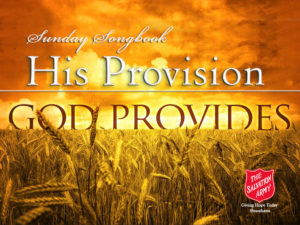How firm a foundation, ye saints of the Lord,
Is laid for your faith in His excellent Word!
What more can He say than to you He hath said,
To you who for refuge to Jesus have fled?
“Fear not, I am with thee, O be not dismayed,
For I am thy God, I will still give thee aid!
I’ll strengthen thee, help thee, and cause thee to stand,
Upheld by My gracious, omnipotent hand.
“When through the deep waters I call thee to go,
The rivers of grief shall not thee overflow,
For I will be with thee thy trials to bless,
And sanctify to thee thy deepest distress.
“When through fiery trials thy pathway shall lie,
My grace all-sufficient shall be thy supply;
The flames shall not hurt thee; I only design
Thy dross to consume and thy gold to refine.
“The soul that on Jesus hath leaned for repose,
I will not, I will not, desert to its foes;
That soul, though all Hell should endeavor to shake,
I’ll never, no never, no never forsake.”
Last week’s song on this blog, I’m in His Hands, was connected to the message of Isaiah 41:10 – “Fear not, for I am with thee…” This passage is quoted in the second verse of this week’s song, followed by more of God’s promises in each verse. In Isaiah 43: 2, God says, “When you pass through the waters, I will be with you…” In 2 Corinthians 12:9, we read, “My grace is sufficient for you…” In Hebrews 13:5, we are promised, “I will never leave you nor forsake you.” What reassurance we can find here! How helpful to be able to sing these promises!
How helpful to be able to sing these promises! Share on XThe writer of these lovely, well-thought-out words is unknown. The song was published in a collection of hymns edited by Pastor John Rippon, with assistance from his minister of music, Robert Keene. The letter ‘K’ was inserted where the author’s name would normally be, so it is thought that the lyrics may have been Keene’s. They can be sung to an Early American Melody , or to the S.A. tunes St. Denio or Foundation.
“My grace is sufficient for you…” Share on XJohn Rippon himself was pastor of Carter’s Lane Baptist church in London, England, for 63 years, beginning at age 24, in 1775. His hymnal, published in 1787, was lengthily titled: A Selection of Hymns from the Best Authors, Intended to Be an Appendix to Dr. Watts’ Psalms and Hymns . It became very popular, and went through eleven British editions in Rippon’s lifetime. An American edition came out in 1820.
“I will never leave you nor forsake you.” Share on XWORDS: ANONYMOUS MUSIC: NOTE TUNES LISTED ABOVE
S.A. SONG BOOK, 2015 EDITION, #804 1987 EDITION, #653
REFERENCE: MORGAN, ROBERT J., THEN SINGS MY SOUL






